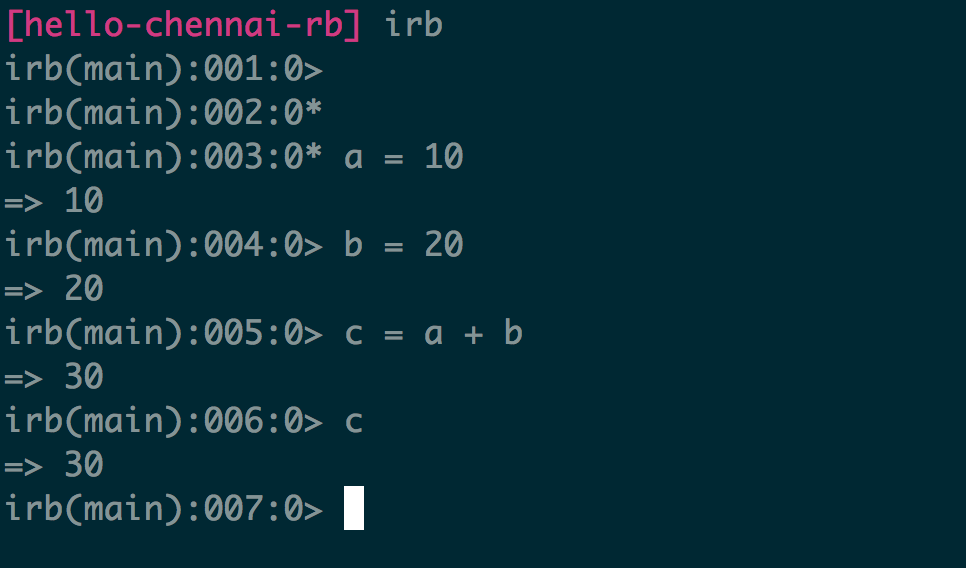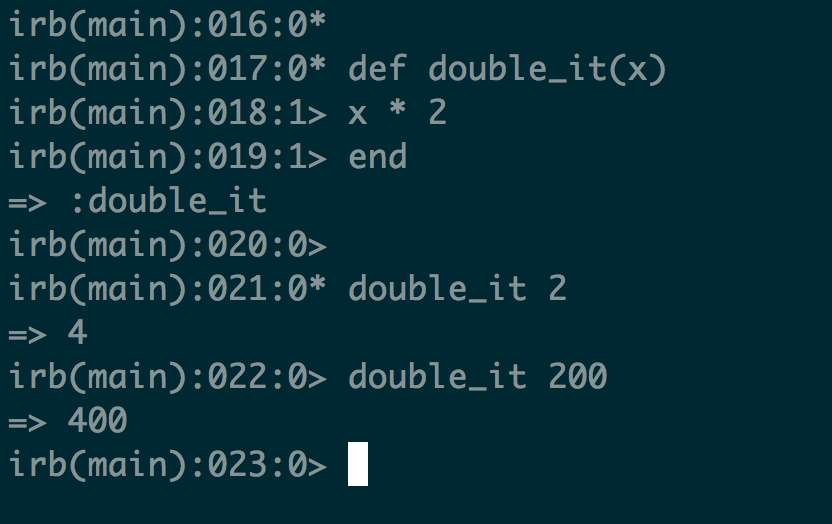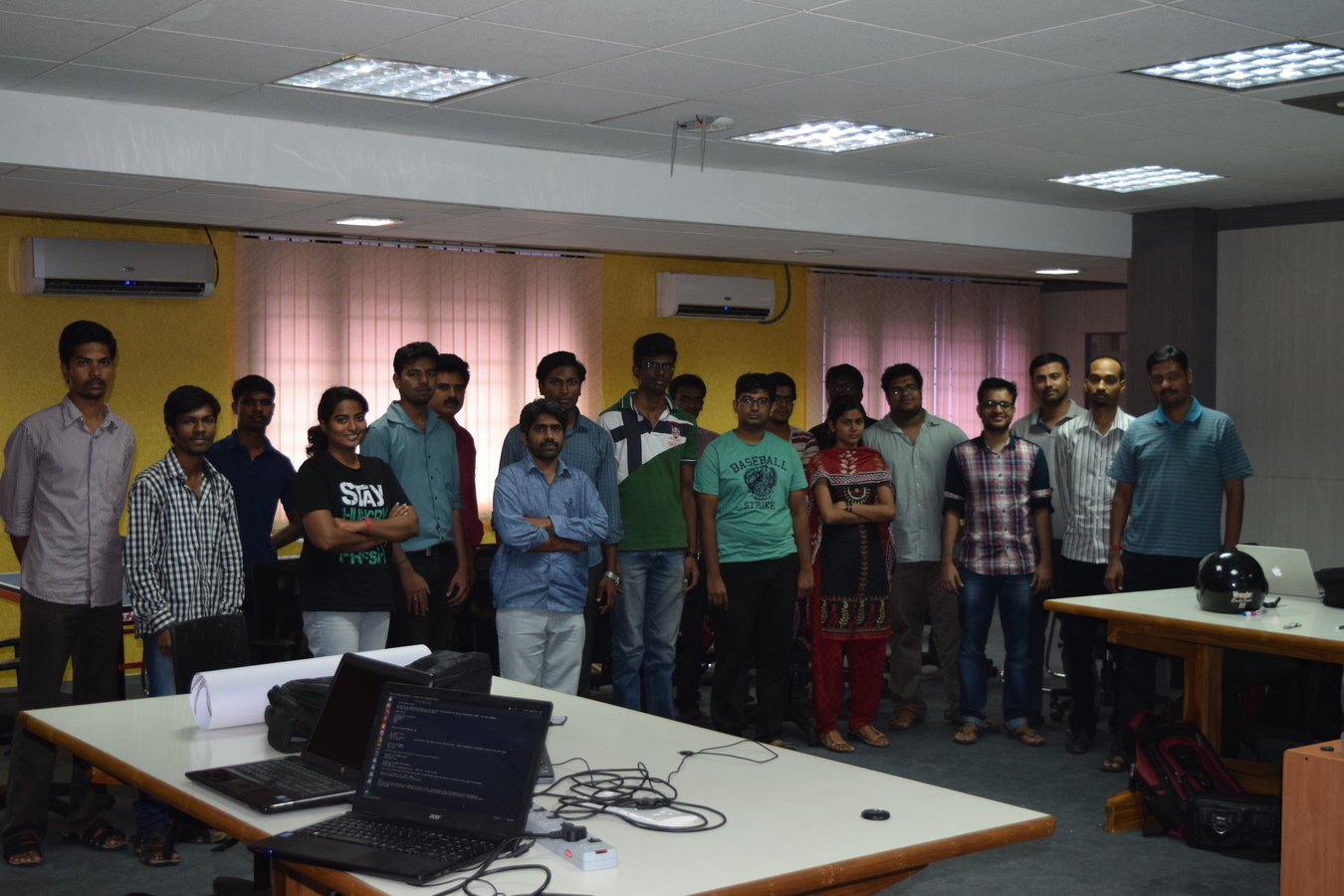Welcome to Chennai-rb
This gives you a whirlwind tour what the Ruby programming language is like, and what the Chennai-rb group is all about.
Ready?
Ruby
- A programming language
- Natural to read, simple to write
- Open source
- Popular
-
Fun
-
Is dynamic
-
Has REPL
-
Has a rich standard library
-
Has lambdas and blocks
-
Has gems (mostly open source libraries)
-
Has a vibrant community
Ruby examples
# The famous Hello World Program is trivial in Ruby.
#
# None of the superfluous:
#
# * A "main" method
# * Newline
# * Semicolons
#
puts "Hello World!"
Ruby examples
cities = ['London', 'Oslo', 'Paris', 'Amsterdam', 'Berlin']
visited = ['Berlin', 'Oslo']
puts "Yet to visit :", cities - visited
Ruby is simple
- Simplicity is the goal
- Code should be easy to write and read
- No ceremony, no unnecessary terms or structures or keywords
Ruby is fun
- Programming becomes interesting
- Everyone can program - getting started is easy
- Solve the problem at hand. Tool/language should get out of the way
Ruby has an REPL
- REPL (Read-eval-print loop) is like a command line interface to the language.
- Ruby's REPL is called IRB
- We can type our program line by line in IRB, and see how it executes
- Makes it easy to try out new libraries, code snippets. And is useful in debugging too
Ruby REPL
Screenshots


Ruby is dynamic
- Dynamic - no need to declare data-types
- Helps keep things simple while approaching new problems, if we are not sure about the data-types
- Helps us focus on the algorithm rather than datatypes
Ruby is dynamic
# Assume 'meaning_of_life' is a library function
# It can return a number or a string
# So x can take a number or a string
x = meaning_of_life()
puts 'Take lite da' if x == 'Be cool'
puts 'Chance-illa' if x == 42- Did you notice the if clause
- Ruby allows us to write code that reads better
Ruby has a rich standard library
- Many facilities for string manipulation and array processing are available right out of the box
-
Some other useful libraries are:
- Date and Time
- Regexp
- Net/Http for Http
- Socket for socket IO
- Thread for multi-threading
- Rake for build tooling
- Json for Json
- Cmath for maths
Ruby standard library
# Sort an array
arr = [12, 5, 6, 8, 1, 33]
arr.sort # => [1, 5, 6, 8, 12, 33]
# Reverse it
arr.reverse # => [33, 1, 8, 6, 5, 12]
# Access it from the tail
arr[-1] # => 33
# Add and subtract
arr + [1, 2, 3] # => [12, 5, 6, 8, 1, 33, 1, 2, 3]
arr - [1, 2, 3] # => [12, 5, 6, 8, 33]
Examples with Array
Ruby standard library
# Joining the array
['abc', 'xyz'].join('-') # => 'abc-xyz'
# Get all permutations
[1, 2, 3].permutation.to_a #=> [[1,2,3],[1,3,2],[2,1,3],[2,3,1],[3,1,2],[3,2,1]]
# Rotate, shift and shuffle
[1, 2, 3].rotate #=> [2, 3, 1]
[1, 2, 3].shift #=> 1
[1, 2, 3].shuffle #=> [2, 1, 3]
# Slice
arr = [ "a", "b", "c", "d", "e" ]
arr[1..3] # => ["b", "c", "d"]
# Remove duplicates
[1, 2, 3, 1, 2, nil].uniq # => [1, 2, 3, nil]Examples with Array
Ruby standard library
# String concatenation
"abc" + "123" #=> "abc123"
# String comparison
"abc" == "abc" # => true
"abc" == "abc1" # => false
# Convert to array
"abc".chars #=> ["a", "b", "c"]
# Split and slice
"hello world".split(" ") #=> ["hello", "world"]
"hello world"[1..4] #=> "ello"
# Change case, Strip, reverse
"hello".upcase #=> "HELLO"
" hello ".strip #=> "hello"
"hello".reverse #=> "olleh"Examples with String
Ruby standard library
Try the examples in IRB.
Its interesting and fun
Ruby lambdas and blocks
- Ruby has the ability to treat code as data.
- This means we can write chunks of code that can be treated like any ordinary Ruby object - can be assigned to a variable, passed around as method arguments etc, before getting executed eventually
- The chunks of code created this way are called lambda.
- An interesting property of lambdas is that they carry their environment with them (they are closures)
- This enables the functional programming paradigm to be used in Ruby
Ruby lambdas and blocks
An example:
#
my_env = "Hello"
my_code = lambda {
puts "A lambda"
puts "Code between the braces can be treated like data"
puts "The variable my_code has the reference to it"
puts "It can be passed around and invoked when needed"
puts "It also carries its environment within itself: the my_env variable"
puts my_env
}
foo my_code
## somewhere in some other file
def foo(given_code)
puts "Given code starts"
given_code.call
puts "Given code ends"
endRuby lambdas and blocks
- Ruby has a feature similar to lambdas called blocks
- A block is a chunk of code, like a lambda. It also carries its environment with itself (closure), like lambdas. The only restriction is that it can be invoked just once.
- Blocks are invoked using the yield keyword.
# foo method takes the block
def foo # A block can be passed without any arguments
puts "Given code starts"
yield # This invokes the given block
puts "Given code ends"
end
# And somewhere else
my_env = "HI"
foo {
puts "This is the block: the code within curly braces"
puts "This will get executed within the foo method"
puts "And will know the variable my_env too"
puts my_env
}Ruby Gems
- Libraries that are not included in standard ruby installation are called gems
-
We need to install them separately
- gem install 'my-gem' (needs internet connection)
- Ruby community has created thousands of gems. For nearly every task we need to write code for, there is a gem.
- Most gems are open source and are available for inspection/ improvement
Ruby Gems: Rails
- Ruby on Rails is also a Ruby gem
- Ruby on Rails is a popular library and framework for web development.
- It is current one among the best options to develop database backed web applications
- It embraces the Ruby philosophy of simplicity and elegance, and adds some of its own
- Rails aims at enhanced developer productivity using ideas like "convention over configuration" and "don't repeat yourself" (DRY)
Ruby Gems: Rails
- Developer productivity mean we can execute in weeks the same projects that take months with enterprise technologies (J2EE, Dot.Net)
- Rails is open source, just like Ruby. Ruby communities support and encourage the open source movement
Ruby Community
- Ruby supports and promotes the idea of community
- This means that people involved in the Ruby programming business - programmers, entrepreneurs, students should meet and interact.
- Such interaction happens both offline and online
- People share knowledge and opinions, discuss issues with current technology and collaborate towards improvement
- There are several Ruby conferences for the purpose - dozens of them happen over the year. There are three in India right now.
- There are also city level user groups. They generally meet monthly, and conduct other events like workshops and hackathons. Chennai has one too.
Ruby Community in Chennai
- There is an active Ruby community in Chennai
- We meet once every month, and sometimes conduct workshops too
- The aim of the community is to help each other by sharing knowledge and opportunities. Its the right place to be for improving your programming skills and finding jobs/internships
- We discuss online using Slack. We have a mailing list, a meetup.com page and a Twitter too - for announcements. All the details are available on the website
Ruby Community in Chennai
A picture from the recent meet-up

Ruby Community in Chennai
- You are most welcome to join the group. Just visit one of the meetups or join the Slack chat
- Like the worldwide Ruby community, we believe in being a friendly and safe place. No one is allowed to be disrespectful to others - especially new-comers and students
- To ensure that it is comfortable for women, we have zero tolerance against sexism.
- We also love polyglotism - this means that our discussions are not restricted to Ruby alone. We talk a lot about Javascript and Clojure and Docker and many other technologies
Ruby Resources
- tryruby.org - Beginner level. Interactive. Free
- Codeacdemy - Beginner to intermediate. Interactive. Free
- rubymonk.com - Basic to advanced. Interactive. Free
- Michael Hartl's Rails tutorial - Comprehensive. Free online
- Learn Ruby the hard way - Free online
- Rails guides - Focussed official documentation. Free.
- _why's poignant guide to Ruby - Quirky introduction book. (copy included here)
- Railscasts - Screencasts. A little old but useful. Partly free
- Codeschool Rails course - Tutorials, videos. Partly free
Chennai-rb links
Created by Abhishek Yadav (h6165) . Freely distributable without change in original content. Copies must hold this notice.
Brand and project names are properties of their respective owners.